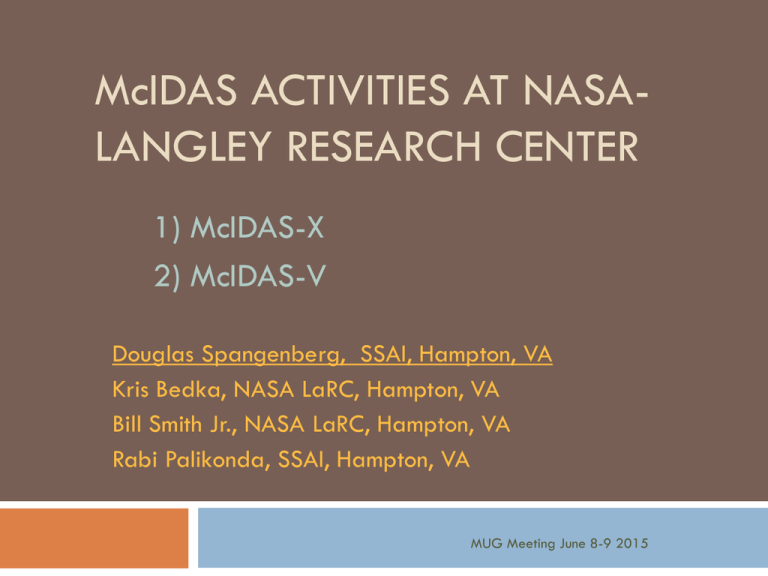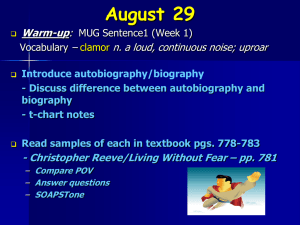McIDAS ACTIVITIES AT NASA- LANGLEY RESEARCH CENTER 1) McIDAS-X 2) McIDAS-V
advertisement

McIDAS ACTIVITIES AT NASALANGLEY RESEARCH CENTER 1) McIDAS-X 2) McIDAS-V Douglas Spangenberg, SSAI, Hampton, VA Kris Bedka, NASA LaRC, Hampton, VA Bill Smith Jr., NASA LaRC, Hampton, VA Rabi Palikonda, SSAI, Hampton, VA MUG Meeting June 8-9 2015 Introduction: McIDAS at NASA Langley Group of about 10-15 people who regularly use McIDAS Files downloaded by McIDAS each day: * ~ 700-1000 satellite image AREA files * ~ 3500-4000 model grids, including analyses and forecasts from GFS, RAP * Data volume: ~25-30 GB/day (mostly from AREA files) We are involved in cloud and radiation studies: * Aviation Safety * Climate change, CERES * Satellite calibration * Integration of satellite data with NWP models * Field research support Customers, users of our data products include: NOAA-NCEP, NOAA-AWC, ARM/ASR (DOE), NCAR, other NASA centers, universities MUG Meeting June 8-9 2015 McIDAS-X Usage Cloud and radiation product generation and display Graphics overlay on satellite imagery * Overshooting tops, high ice water content probability * Flight tracks, sea-ice edge, lightning GUI used to support field experiments on site Calibration: Write out gridded image data for satellite inter-comparison Convert image AREA files to binary flat files for CERES processing Shell scripts, mcenv, batch processes used for generating web site GIF images MUG Meeting June 8-9 2015 New McIDAS-X Code lineseg_cldprd: Extract pixel data along a specified line segment using endpoint Lat/Lon coordinates satangles: Computes and prints VIEWING, SOLAR, AZIMUTH angles and scan time at the cursor center rgbdn_satimg: Allows for combining day, night RGB channels into one image based on SZA parallax_cldprd, parallax_satimg: Parallax-correct cloud products and satellite imagery * ~10% of pixels unfilled where nothing mapped from * some can be filled using spatial interpolation satolay_ost: Overlay overshooting top, high ice water content probability graphics on satellite imagery * similar to nexrad radar overlay MUG Meeting June 8-9 2015 GOES-13 IR Image with Lightning Overlay *text2md *ptdisp for 3 time ranges *20:45 UTC 01Jun 2015 *Northern Coast of S. America *For High Ice Water Content High Altitude Ice Crystals (HIWC-HAIC) Field Experiment MUG Meeting June 8-9 2015 Changeable IR Image Enhancement Based on Tropopause Temperature (TROP-T) *G13 IR 08:45 UTC 15 May 2010 *Start with initial EU BRIT *Northern Coast of S. America table, TROP-T *For HIWC-HAIC Field Experiment *Convert new TROP-T to BRIT *Apply TROP ΔBRIT to whole color table Trop T (K)=Red/White border MUG Meeting June 8-9 2015 Meteosat-10 Parallax Correction *Used parallax_satimg *Mean cloud height in 2 layers based on preset IR BT range *MET-10 IR 20:00 UTC 05 May 2015 *Northern Coast of S. America *For HIWC-HAIC Field Experiment MUG Meeting June 8-9 2015 NOAA-AVHRR 10.8mm Composite Image NOAA-15, 18, 19 09:47-18:10 UTC 14 Sep 2014 *merge_polar *TLE, NAVDISP *For Arctic Radiation-Ice Bridge Sea & Ice Experiment (ARISE) MUG Meeting June 8-9 2015 Aqua MODIS RGB Image from ARISE 21:53 UTC 24 Sep 2014 *McIDAS PATH command used Preflight Track Pattern Current Flight Position Ice Edge Data MUG Meeting June 8-9 2015 NOAA-19 RGB Image from ARISE NOAA-19 20:57 UTC 21 Sep 2014 *flttrk_olay *TLE, NAVDISP C-130 Flight Path CALIPSO Orbit TERRA Orbit C-130 Altitude MUG Meeting June 8-9 2015 GOES Cloud Products: Scene ID, Water Path (gm-2) *Liquid water path can be derived for ice over liquid clouds *New total water path product GOES-13 19:15 UTC 13 Mar 2015 *Used imgdispcp, imgdispwp display commands Aviation Safety Cloud Products: Icing Threat *GOES-13, GOES-15 Merged Image *Used geo_composite, imgdispcp 20:15 UTC 01 Feb 2015 MUG Meeting June 8-9 2015 Aviation Safety Cloud Products: Icing Base (Kft) GOES-13, GOES-15 Merged Image ZBOTI (Kft) 20:15 UTC 01 Feb 2015 MUG Meeting June 8-9 2015 Aviation Safety Cloud Products: Icing Top (Kft) GOES-13, GOES-15 Merged Image 20:15 UTC 01 Feb 2015 MUG Meeting June 8-9 2015 GOES-13 Daytime RGB Image * Red=0.63, Green=3.9-10.7, Blue=10.7 mm * No red/VIS after sunset 23:45 UTC 31 May 2015 MUG Meeting June 8-9 2015 GOES-13 Daytime, Nighttime RGB Image * Day: Red=0.63, Grn=3.9-10.7, Blu=10.7 mm * Night: Red=3.9, Grn=10.7, Blu=3.9-10.7 23:45 UTC 31 May 2015 *rgbdn_satimg -Program combines all necessary1-byte RAW, BRIT input data -Writes out new AREA files for each component SZA=82o MUG Meeting June 8-9 2015 GOES-13 Overshooting Top (OT) Overlay * Used satolay_ost to overlay OT graphics on VIS image * BATCH, ZA, ZLM for colorbar *11:15 UTC 29 May 2015 *Centered at French Guiana *For HIWC-HAIC field experiment MUG Meeting June 8-9 2015 GOES-13 High Ice Water Content (HIWC) Probability * Used satolay_ost to overlay HIWC graphics on IR image *BATCH, ZA, ZLM for colorbar *11:15 UTC 29 May 2015 *Centered at French Guiana *For HIWC-HAIC field experiment MUG Meeting June 8-9 2015 McIDAS-X Summary Invaluable for field experiment support using GUI. Overlay flight tracks, lightning, sea ice edge, OT, HIWC probability on imagery Run many automated processes for generating webpage imagery using mcenv, shell scripts, BATCH files Display cloud products (water path, optical depth, particle size, T, Z) with colorbars Extract data along line segments or over ground sites Parallax correction Obtain gridded data for satellite calibration Use TLE files to plot satellite orbit tracks MUG Meeting June 8-9 2015 McIDAS-V Usage McIDAS-V is being used regularly by several members of the LaRC Cloud and Radiation Research Group Primary use cases include: 1) Ingest of LEO and GEO cloud mask and cloud property retrieval data in NetCDF format * Creation of RGB composites from user-generated formulas. Display cloud mask/retrievals on RGB and toggle. Zoom in on small regions and probe individual pixel values to assess mask/retrieval product quality * Quick visualization QC of NetCDF product files to ensure they’re being written correctly and no problems * Display daily/monthly mean gridded products for direct comparison with other climatologies 2) Analysis of deep convective clouds in LEO and GEO satellite imagery in combination with other ground-based, model data * Data formats: GRIB, ADDE AREA, NetCDF, and ascii text point data. Data includes 1) ground-based lightning detection, radar, severe storm reports, 2) satellite imagery and automated hazardous storm detection products * Several hundred frames of GOES-14 1-min data and derived products displayed and movies captured MUG Meeting June 8-9 2015 GOES Super-Rapid Scan Imagery and Derived Products McIDAS-X used to acquire GOES-14 SRSO data and convert to NetCDF for input to an automated hazardous convective storm detection product. Output written to NetCDF for each GOES image. “Aggregate Grids By Time” data type used to group 240 storm detection files into 1 data object. Userdeveloped formulas used to develop masks based on selected criteria (IR BT, visible texture detection threshold, overshooting top probability, etc..) in right panel. Severe storm reports acquired from the SPC database, formatted for Mc-V in ascii text, and overlaid on the VIS image. GOES Infrared – NWP Tropopause Temperature Difference GOES Water Vapor – Infrared Temperature Difference Degrees Celsius Degrees Celsius Bedka et al. (2010) OT Detection Deep Convective Cloud Analysis *Cursor lat/lon used to record overshooting cloud top (OT) locations which are displayed with white circles *Satellite IR differenced from NWP TROP T, two differing projections/resolutions *Spectral band differencing and automated OT detection output also displayed Overshooting Top Identifications by a Human *A colorbar label option (i.e. Degrees Celsius) would be very helpful to improve figure presentation quality Daily Gridded AVHRR Composite Products NetCDF files with gridded cloud and clear-sky products at 0.1o res. Jython Formula was used to create the RGB. Useful to have capability to add text labels to colorbars rather than having to include legend in plot title (cloud phase). (km) Trajectory Model Output Air parcels were released from the Nabro volcano eruption at various heights (in Eritrea-northeast Africa). Data integrated into Mc-V as point observations and colored by parcel height. Data overlaid on 3-hourly Meteosat-7 IR images over a 10-day period to see if/how these parcels interacted with deep convective clouds. Suggested Areas for McIDAS-V Improvement Allow selection/display of ADDE datasets across multiple days. Currently one can only load ADDE-based data one day at a time which becomes clunky when dealing with long multi-day animations. Improvement of cursor data probe performance with user-generated NetCDF data, see Bedka Mc-V forum posts for examples. Improved garbage collection and memory allocation. If a display and required data uses 10 Gb of memory and is then removed, memory usage should decrease by 10 Gb. Currently this is not the case, causing unnecessary drain on computer performance. Improve support for flat binary files. Chooser a bit awkward to work with and both little & big-endian files not supported. See Bedka forum posts for examples. Improve performance for ascii text point datasets. Far too much memory is currently required to display point values. MUG Meeting June 8-9 2015 Potential Areas to Expand McIDAS-V User Base at NASA-Langley & other NASA Centers Consider support for current/future NASA Earth Venture space borne instrument and airborne datasets *Examples: TEMPO: Hourly geostationary-based trace gas and air pollution retrievals. CATS: A CALIPSO-like instrument currently aboard the ISS. CYGNSS: Space-based retrievals of surface wind speed *Airborne data is typically in-situ with vertical profiles (remotely-sensed, dropsonde) or swath-based image data (possibly hyperspectral) collected during the flight. Mc-V is well positioned to support these data types. Having the ability to quickly visualize and colocate a diverse set of instrument data would be extremely useful during and after the campaigns. User-generated trajectories from NWP model fields. This capability used to be available with Vis-5D. Will be very useful to trace air pollution plumes observed by TEMPO Enhanced support for CALIPSO Level 2 data products (HDF) MUG Meeting June 8-9 2015 GOES Cloud Products: Scene ID/Phase GOES-13 19:15 UTC 13 Mar 2015 MUG Meeting June 8-9 2015 GOES Cloud Products: LWP (gm-2) GOES-13 19:15 UTC 13 Mar 2015 MUG Meeting June 8-9 2015 GOES Cloud Products: TWP (gm-2) GOES-13 19:15 UTC 13 Mar 2015 MUG Meeting June 8-9 2015

